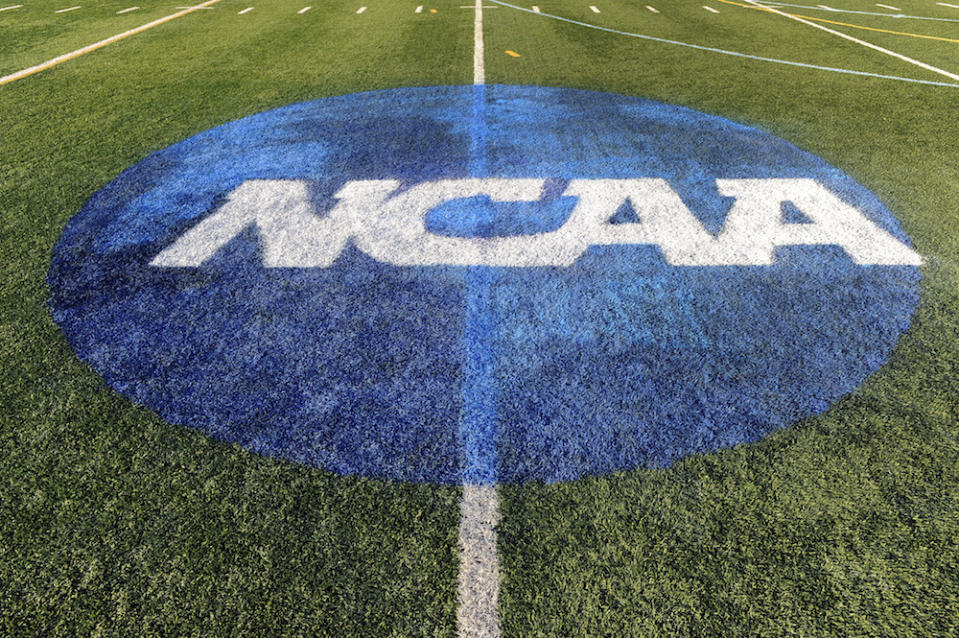NCAA reaches $1.2 million settlement in wrongful death suit

The NCAA has reached a settlement in a lawsuit filed by the family of a Division III football player who died after collapsing during a practice.
According to the Associated Press, the NCAA and co-defendants agreed to pay $1.2 million to the Derek Sheely Foundation, an organization started by the parents of Derek Sheely, a former fullback for D-III Frostburg State (Maryland) who died from a head injury in 2011. It marks the first time the NCAA has agreed to pay a defendant in a head injury case.
“This is a landmark settlement not just because it is the first brain-injury case that the NCAA has agreed to pay a significant amount of money to resolve, but also because the stakeholders of football are now on notice that they have an obligation to protect the health and safety of the athletes,” said Kenneth McClain, attorney for Ken and Kristen Sheely, Derek’s parents.
Sheely was a 22-year-old senior when he died in August 2011.
Parents Ken and Kristen Sheely of Germantown alleged in their $1.6 million lawsuit that he was a victim of “second-impact syndrome” – a brain injury that occurs before a previous concussion has healed.
“Preseason practices at Frostburg served more as a gladiatorial thrill for the coaches than learning sessions for the players,” they said in a filing.
His parents contended that Sheely had suffered a concussion the previous season and was bleeding persistently from the forehead in 2011 after several days of drills. They alleged that when he complained of a headache on the day he was fatally hurt, then-assistant coach Jamie Schumacher yelled, “Stop your bitching and moaning and quit acting like a p—y and get back out there, Sheely.”
Neither the NCAA nor the other defendants – three athletic staff members, Illinois-based helmet maker Kranos Corp. and Pennsylvania based helmet retailer George L. Heider Inc. – admitted liability.
Two years after Sheely’s death, his parents sued the NCAA, two Frostburg coaches, the school’s trainer and a helmet manufacturer. The NCAA argued it did not have legal responsibility as a sports organization to protect football players from suffering injuries — specifically second-impact syndrome, which is said to have killed Sheely — but Montgomery County (Maryland) circuit court judge David Boynton declared otherwise in April. A trial had been scheduled for June.
The NCAA previously fought and failed to keep documents sealed in the case.
Kristen Sheely said the family had an interest in seeing the case play out in court, but worried a Maryland state law could derail the outcome.
“On the one hand, we wanted our day in court,” Kristen Sheely said. “On the other hand, we knew the nightmare that we’d have to live with for five weeks. It’s really the definition of dilemma. You have two bad choices: go to trial and risk losing, or settling.”
A major concern was Maryland state law, “which terrified all of us,” Kristen Sheely said. If the jury found that even 1 percent of Derek’s death was his own fault, the Sheely family would lose.
As part of the settlement, Sheely’s jersey is allowed to be retired by Frostburg State. Additionally, per CBS, the school plans to award a full scholarship to a student in Sheely’s honor for at least 10 years.
NCAA chief legal officer Donald Remy said in statement the NCAA hopes the settlement and the Sheely foundation can help with concussion research and prevention.
“While the settlement acknowledges no admission of liability by the NCAA, the NCAA believes this settlement will help the foundation advance research and education in the prevention of traumatic brain injury,” Remy’s statement said. “As a leader in promoting enhanced safety in college sports, the NCAA is firmly committed to fostering greater understanding of student-athlete well-being.”
In July 2014, the NCAA proposed a $70 million fund to assist in concussion testing and diagnosis while settling with many plaintiffs (former players) who had sued the association. A federal judge rejected the settlement in December 2014, saying it was underfunded and that the two sides should “go back to the drawing board.”
– – – – – – –
Sam Cooper is a writer for the Yahoo Sports blogs. Have a tip? Email him or follow him on Twitter!


